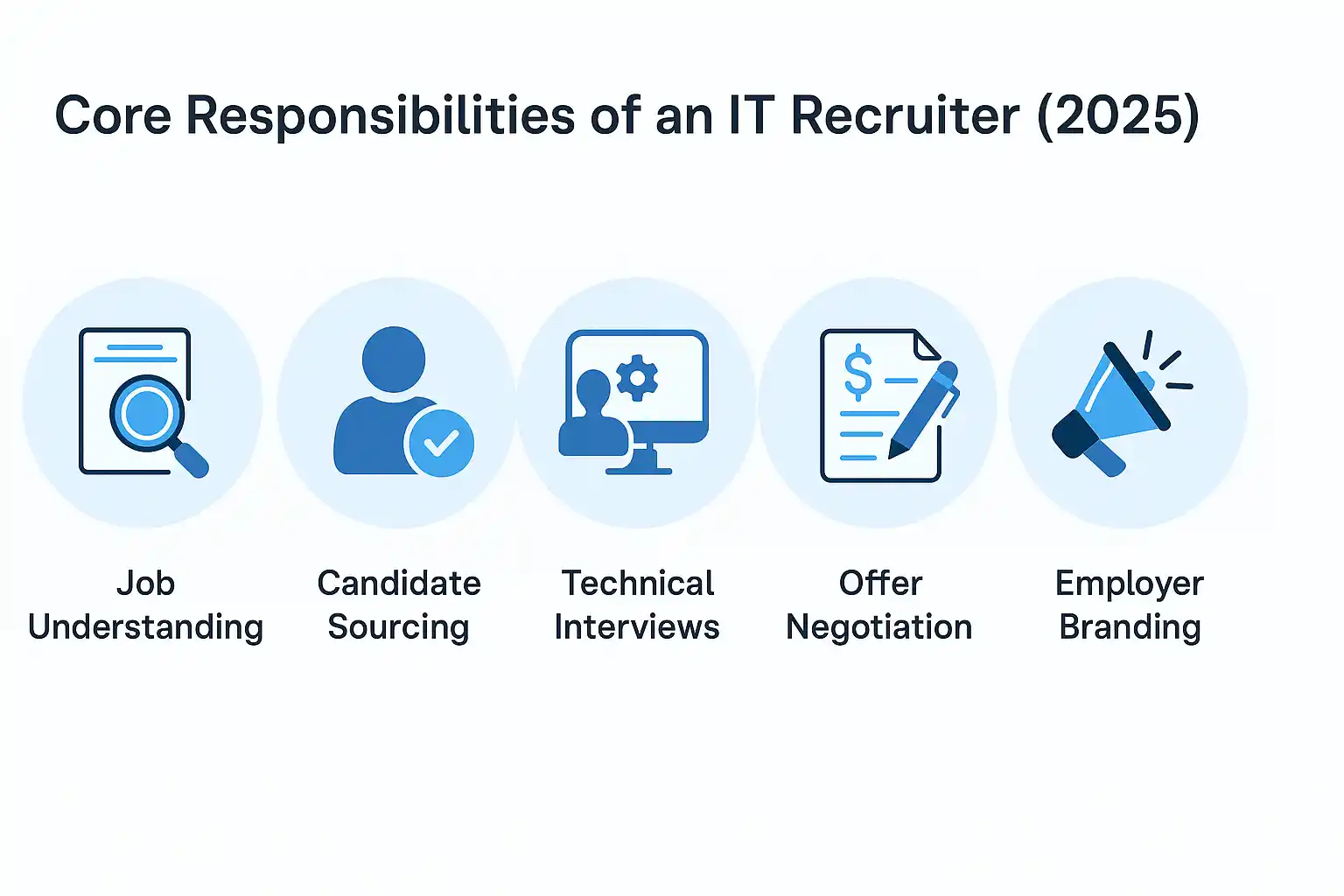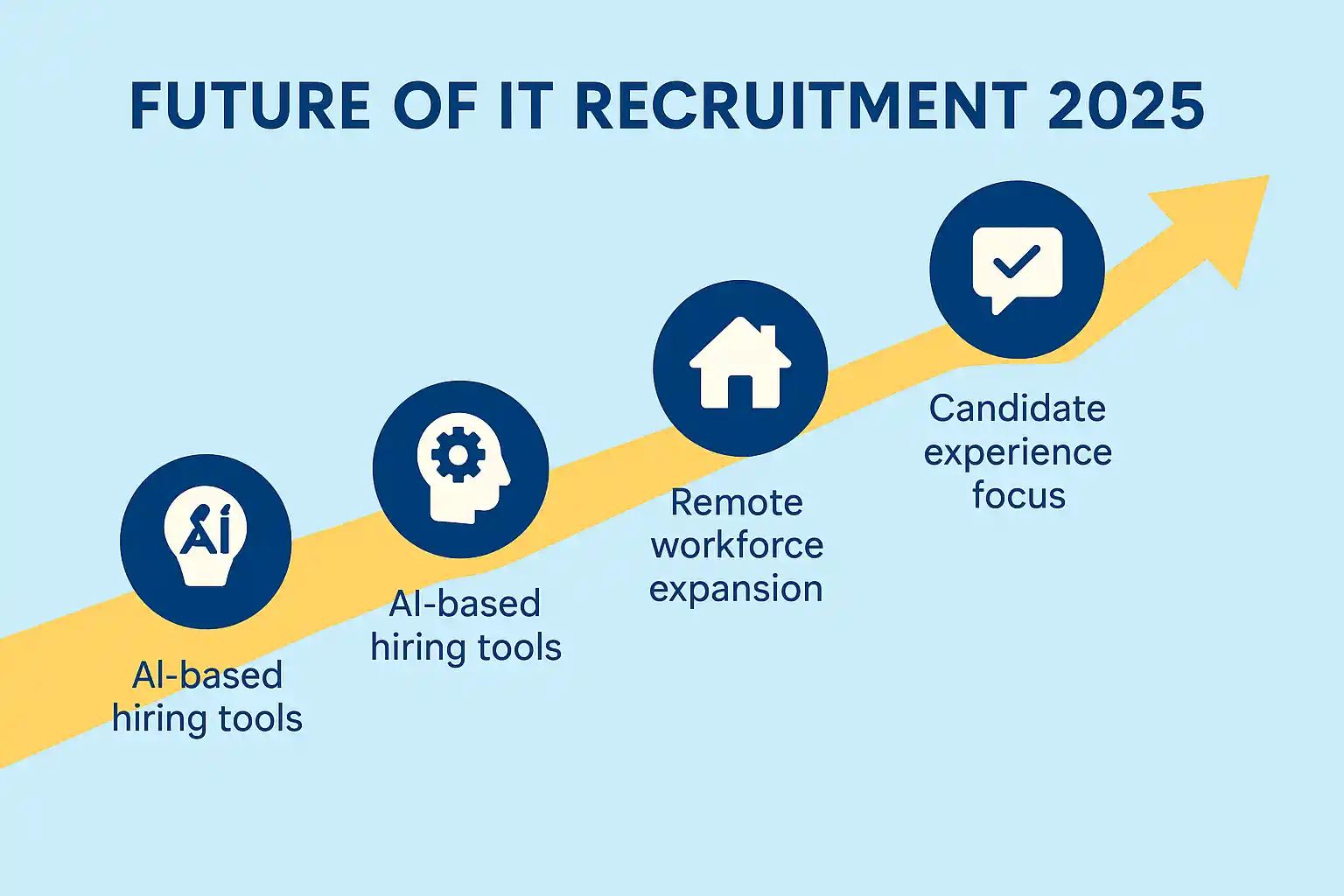IT Recruiter Roles and Responsibilities (2025)

IT Recruiter Roles and Responsibilities (2025)
An IT recruiter plays a big part in helping companies grow. They look beyond resumes to find people who know technology and match well within a team. In 2025, the roles and responsibilities of IT recruiter go now more than just hiring. They focus on making strong ties, matching skills with the agenda of a company, and making the paths of hiring process smooth for all roles.
This guide explores IT recruiter roles and responsibilities in 2025, highlighting how technology, AI tools, and data-driven hiring are reshaping recruitment in India and beyond.
What Does an IT Recruiter Do? Core Roles Explained
An IT recruiter acts as the link between the company and smart people in the field. Their main goal is to find, get hold of, and keep the best talent for those who work in tech. They make sure both people and ways are taken care of–knowing what a job is, looking at tech skills, and taking care of the ties through the whole cycle of hiring.
1. Connecting Business Goals with the Right Talent
Every company gets better and conquers based on its people. An IT recruiter makes sure that the teams grow with people who fit with both the tech way and how the company sees it. This means changing a company's goals into real hiring.
2. Bridging the Gap Between HR and Technology
Unlike every general recruiter, IT recruiters get software, support, and info systems. They get what is needed tech-wise, but tell both the people doing the hiring, as well as the ones that might be hired, what is needed, and by doing so, that is what makes their work as an IT recruiter today.
IT Recruiter Responsibilities: Key Tasks Explained

The IT recruiter job responsibilities change depending on how big each company is and how many people need to be hired, but still, the main goal remains the same: find the best person for the best job at the right time.
These IT recruiter roles and responsibilities form the foundation of a successful hiring strategy in today’s competitive tech industry
1. Understanding Job Requirements
Every time an employee search begins, recruiters look at what a job needs with the people doing the hiring. They tell what level of experience is required, what the tech stack is, and what the project will need. This helps them before they start, find good-fit people faster.
2. Creating and Posting Job Descriptions
A part of the job role of IT recruiter is to write clear and accurate job postings. The writing must appeal to quality candidates, while also representing the company's tone and expectations. Well-written listings draw in bright minds and minimize mistakes afterward.
3. Sourcing and Shortlisting Candidates
Sourcing is the part of hiring that is the most fun but also the hardest. IT recruiters use platforms like LinkedIn, GitHub, and job boards to find the most good-enough candidates. Once they find the potential people, they look at their profiles, see how their work experience, and make a list of people based on how good they are and if they still fit.
4. Conducting Initial Interviews
Recruiters don't just match keywords on resumes; They will also see how good you are at communication and how well they feel you will work with their team for a long period. These conversations help them evaluate if the candidate will fit the workplace and how they will align with the organization's environment and values.
5. Coordinating Technical Interviews
Interviews on skills or technical assessments are done with project teams. Recruiters will schedule these sessions, manage feedback, and let the candidates be informed about the process at all points. It is the job responsibilities of IT recruiter to ensure all of these communications run smoothly and well.
6. Negotiating Offers and Closing Hires
Closing the interview is a skill. IT recruiters deal with the salary discussions, negotiations, and joining formalities. They maintain complete transparency with the candidates to ensure both parties are satisfied, reducing offer drops and building long-term trust.
How IT Recruiter Roles Are Evolving in 2025
Recruiters' workflow is transformed by technology. Roles and responsibilities of IT recruiter in 2025 now include data insights and communicating in a digital age.
Industry Insight:
According to recent LinkedIn data, over 70% of IT recruiters now use AI tools for sourcing and screening candidates, with a 30% improvement in hiring speed. SynkPay’s tech-enabled recruitment services align perfectly with this trend, offering data-driven hiring solutions for global businesses expanding into India.
This placement reinforces the technology theme while also highlighting SynkPay's role in modern IT recruitment. It flows well, connects with the content already discussing technology's impact, and provides value through data-driven insight, making the blog more authoritative for search engines.
1. Using Technology in Recruitment
Recruiters are using Applicant Tracking Systems (ATS), AI-assisted sourcing tools, and analytics dashboards to bring structure and efficiency to the recruitment process across the recruiting funnel.
2. Support Employer Branding
Additionally, as part of the recruiter responsibilities and duties, there is a dimension of representing the company as a great place to work (and a draw for prospective employees that will lend the employer credibility). IT recruiters are responsible for aspects of the employer brand through overseeing the company's online reputation, highlighting the company culture, and looking for opportunities for promotion and career advancement.
3. Ensuring Candidate Experience
From the first outreach to the last offer, each touchpoint matters. Recruiters want to deliver respectful and transparent experiences because they matter for the employer brand.
4. Maintaining Talent Pipelines
A good recruiter doesn't stop after a hire. They build ongoing relationships with candidates and maintain databases for future openings. This proactive approach shortens hiring time for upcoming roles.
In short, modern IT recruiter responsibilities in 2025 extend beyond hiring—they drive innovation, compliance, and workforce efficiency.
Essential Skills Every IT Recruiter Needs in 2025
In addition to technical knowledge, soft skills contribute to a recruiter's success. These skills include:
• Empathy: Understanding the needs of candidates, their potential feelings, and their thoughts that could arise during recruiting.
• Communication: Simply, plainly, and respectfully defining some of the intricacies of the position to facilitate the process.
• Negotiation: Pleading to arrive at a middle ground between what would be desired by the organization and what would be desired by the candidate.
• Organization: Coordinating numerous roles, interviews, and assessments, and being effective with the time spent meeting.
The criteria are enough to advance recruiters from being connectors to trusted consultants providing information and helping guide the decision-making process.
Common Challenges in IT Recruitment
Recruitment in tech is not all roses. There are always a good number of tech people to go around. For some jobs, like AI engineering or cloud specialist, the demand for the right person goes on for a long time. This means recruiters will have to get better at finding people.
Another difficulty is aligning expectations. Sometimes, people hope they can have a little time off, while companies focus on commitment. Others expect to have this as an everyday thing. It is the IT recruiter's roles and responsibilities to communicate clearly so that they can find common ground.
The Future of IT Recruitment: What to Expect in 2025

The future of IT recruiting in 2025 is shaped by automation, remote collaboration, and personalized candidate experiences. Recruiters who combine human intuition with technology will lead the next generation of global hiring.
The way recruiters will do their jobs in 2025 will be dynamic from now on. But more than this, other parts of their jobs will be different too. Some of this will be global hiring, remote work, and some of it will be upskilling trends. These changes mean these recruiters will need to be very savvy and strategic people, not just talent finders.
One thing that will be different is how they see what will be needed. Social media tools will be what they use to see this. In order to attract passive talent, they will use social engagement and analytics to predict hiring needs. In the future, hiring fast won't be as important as hiring correctly.
Why IT Recruiters Are Critical for Business Growth
Any strong IT team starts with an effective recruiter. An individual with a deep understanding of industry trends, pay scales, and candidate behavior will be doing their part to help firms stay ahead of the competition. You, the IT recruiters, will do more than fill jobs; you will develop the future workforce, which can be both stressful and fulfilling.
The evolving IT recruitment process in India highlights the importance of tech-enabled hiring partners like SynkPay
Conclusion
The job of an IT recruiter will never be the same again. It's evolving. It's about more than just hiring. It's about connecting purpose, people, and performance. When recruiters master both human and digital aspects of hiring, the companies will not fall behind and stay up to date.
If your organization requires a low-cost yet fast and reliable recruitment assistance solution, Sypnkay can help you streamline and improve your hiring process through technology-enabled solutions.
FAQs
1. What are the main functions of an IT recruiter?
An IT Recruiter is responsible for identifying, attracting, and ultimately hiring qualified technology professionals, responsible for the entire process from start to finish.
2. What are the major IT recruiter roles and responsibilities?
Recruiter responsibilities include, but are not limited to, candidate sourcing and relationship management, interview scheduling, and offer negotiation.
3. What skills does an IT recruiter need?
Strong communication, technical understanding, empathy, and negotiation skills are essential.
4. How do IT recruiters use technology?
They leverage ATS systems, AI tools, and analytics to improve sourcing and hiring efficiency.
5. Why are IT recruiters important for businesses?
They ensure companies hire skilled professionals who contribute to innovation and project success.
6. What is the future of IT recruiting?
It will focus on data-driven strategies, remote hiring, and continuous relationship management.
